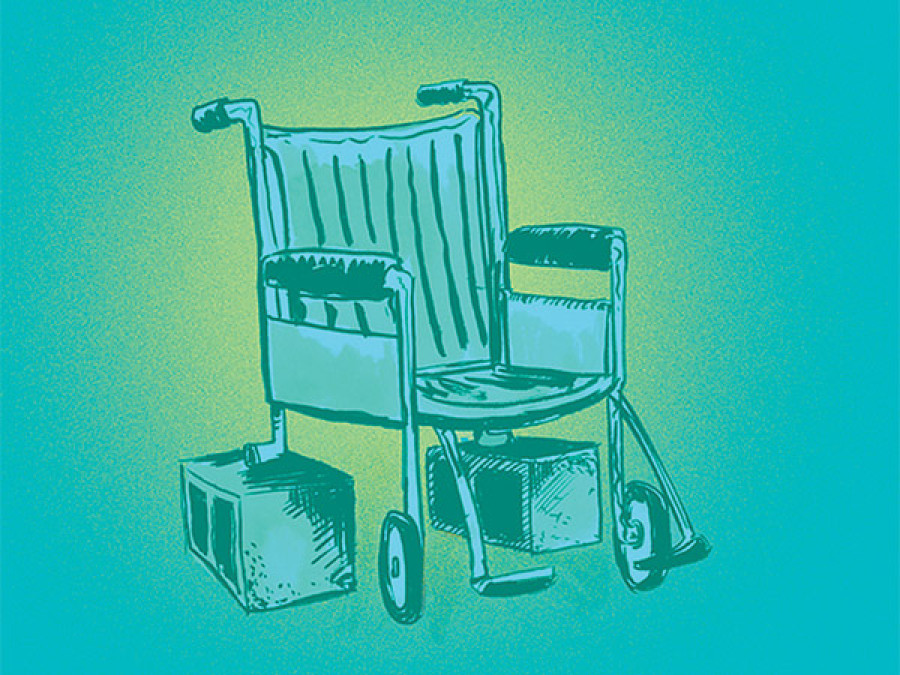Opinion
A step forward 2015-08-13
Nepali society in general still perceives disability as god’s punishment and tends to stigmatise disabled persons. As a result, many of them remain unaware of their rights and are deprived of many government services and the basic right to health, education and employment. As disabled persons are among the poorest of the poor, Nepal must include provisions in the upcoming constitution that prioritise them in development plans to help them overcome their persistent poverty. Doing so will also ensure and increase their inclusion and participation in society.
Sudarshan Neupane
Nepali society in general still perceives disability as god’s punishment and tends to stigmatise disabled persons. As a result, many of them remain unaware of their rights and are deprived of many government services and the basic right to health, education and employment. As disabled persons are among the poorest of the poor, Nepal must include provisions in the upcoming constitution that prioritise them in development plans to help them overcome their persistent poverty. Doing so will also ensure and increase their inclusion and participation in society.
Good moves
The draft constitution seems to have internalised this to an extent. To begin with, Article 23 on right to equality prohibits any discrimination based on disability and bodily condition of any person. It also mentions that special protection shall be provided to the physically and mentally challenged persons. However, this provision could exclude persons with intellectual, sensory and other disabilities. It is crucial to amend the provision because only by including all disabled groups can discrimination against any person with any form of disability become unconstitutional.
Accordingly, Article 36 (3) mentions that persons with disabilities will have the right to free higher education. It has also included provisions for deaf, blind persons to higher education through the Braille script and sign language. It is nevertheless silent about the level of education and how this will be executed. Inclusive education must be the starting point and children with disabilities should be educated in the mainstream schools, together with others. In essence, the new constitution should direct the state to take appropriate measures to ensure disabled persons’ accessibility to education. It should build on Article 44 (9) which states that disabled and vulnerable children should receive special protection from the state. Based on this provision, it can be assumed that the draft constitution recognises the right of every human being to obtain special treatment as non-negotiable.
Article 47 (1) highlights that persons with physical and mental disabilities will have the right to participation in the state structure and public service based on the principle of inclusion. Further, Article 47 (3) mentions the right to live a dignified living with equal access to public service and facilities.Unfortunately, many government offices and public facilities within the Singha Durbar are inaccessible to disabled persons. There are no elevators and guiding rails to accommodate wheelchairs, toilet cubicles as appropriate to disabled persons and there is no recorded voice guidance for persons with visual impairment. This demands specific measures by the government to ensure accessibility of disabled persons to government buildings and amenities. Corresponding to the United Nations Convention on the Rights of Persons with Disability, it is the responsibility of the government to ensure equal access to transportation, communication, information and other facilities to disabled persons to ensure their full participation in public life.
To its credit, Article 47 (5) of the constitution talks about mutiple opportunities for disabled persons in education, health, employment and social security. Article 48 further mentions a special social security provision for them. However, it is unclear when such services will be ensured by the law. What Nepal, therefore, needs to do is to formulate clear policies to address the issues of its disabled persons.
Room for improvement
Though the draft constitution has some remarkable provisions to ensure human rights of the persons with disabilities, it has not been able to avoid the ‘charity-based model’ of doing things. Nowhere does the statute acknowledge the self-reliance of these persons for employment and their dignified living. This goes against the rights-based way of addressing the problems faced by disabled persons.
Further, the draft constitution does not list clear policies on the political representation of persons with disabilities. It is necessary to specify a quota, ie, they should have at least one or two members in the House of Representatives. Such ensured representation in Parliament will have a positive influence in policymaking and help to draft laws in favour of the disabled. It is equally necessary to ensure representation of the disabled persons in federal and the local administrative units.
In addition, as of now, neither hospitals nor health professionals can communicate in sign language. Therefore, simply by making this constitution available in sign language the government can help persons with hearing and speech disabilities overcome communication barriers they currently face with regards to access to the statute. It could also be a huge symbolic gesture that the government is indeed committed to building an inclusive state.
To conclude, like all negotiated documents, this constitution has its share of flaws. It simply states that government will provide assistance to disabled persons without spelling out the type of support. Also, while asserting special social protection measures to persons with physical and mental disability, the constitution seemingly excludes other disabled groups. As disability is an evolving, contentious and cross-cutting concept, it requires attention from the government, private sector, and the non-governmental organisations.
The constitution should be amended to make it mandatory for all government departments to have a job quota for disabled persons. This could go a long way in ensuring the accessibility of government services to persons with disabilities. If the constitution mandates all government offices to recognise rights of the disabled persons, other stakeholders can be expected to gradually change their attitude towards disability too.
Neupane is Livelihood Advisor at Handicap International Nepal




 20.53°C Kathmandu
20.53°C Kathmandu











